HRM 300 Week 4 Assignment: Compensation, Benefits, and Retention
VerifiedAdded on 2022/08/11
|5
|1003
|34
Homework Assignment
AI Summary
This assignment, focusing on Human Resource Management (HRM), explores the intricate relationship between compensation and employee retention. It examines how salary, benefits, and various rewards influence an employee's decision to stay or leave an organization. The analysis includes the impact of compensation factors, the concept of a Total Rewards Philosophy, and the distinction between rewards and compensation. The importance of employee motivation is discussed, alongside the provision of both monetary and non-monetary rewards. The assignment concludes by identifying essential benefits such as paid time off and training and development, emphasizing their significance in enhancing employee morale and skills. The student utilized provided resources to support the ideas, and the assignment reflects a comprehensive understanding of the topic.
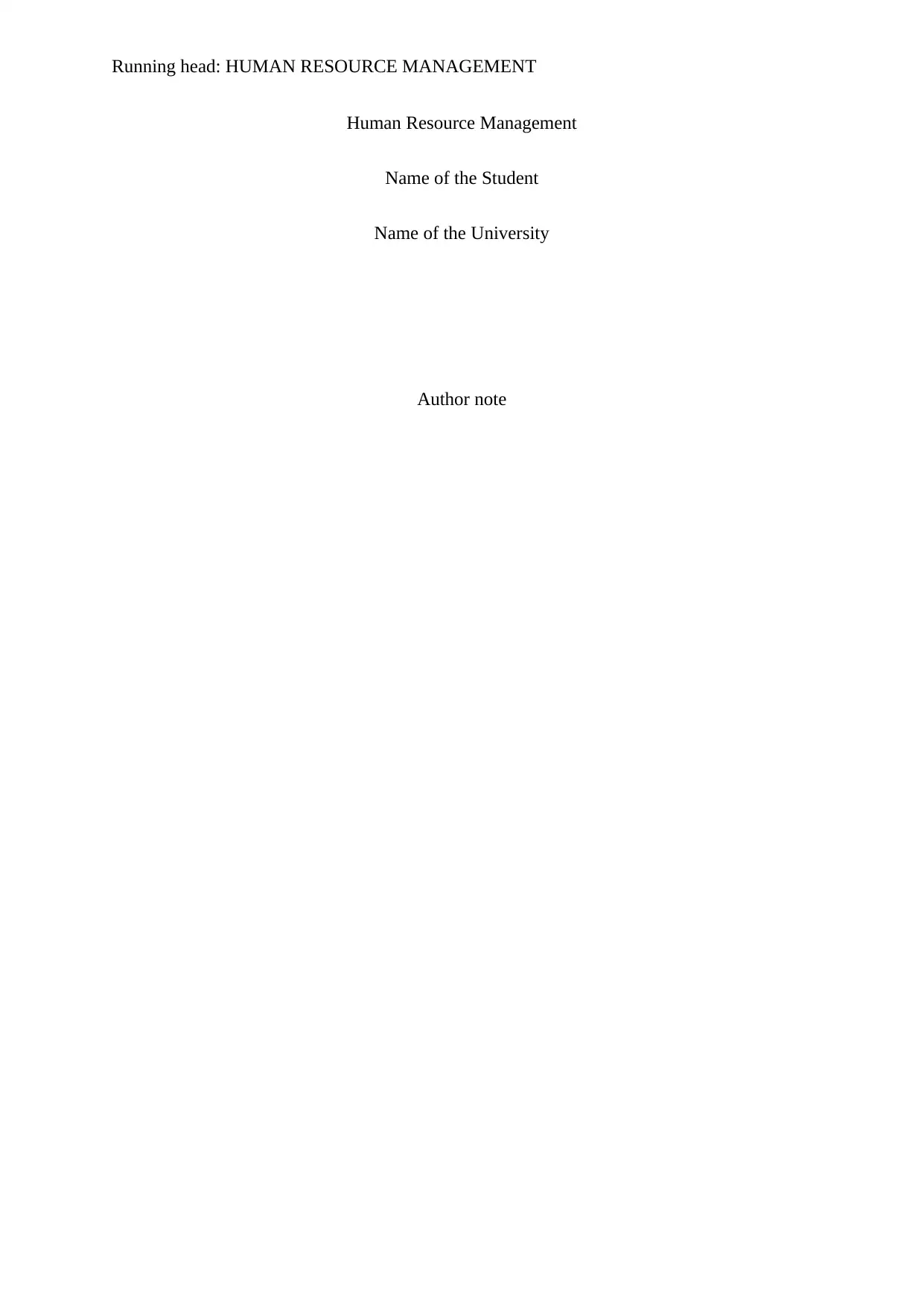
Running head: HUMAN RESOURCE MANAGEMENT
Human Resource Management
Name of the Student
Name of the University
Author note
Human Resource Management
Name of the Student
Name of the University
Author note
Paraphrase This Document
Need a fresh take? Get an instant paraphrase of this document with our AI Paraphraser
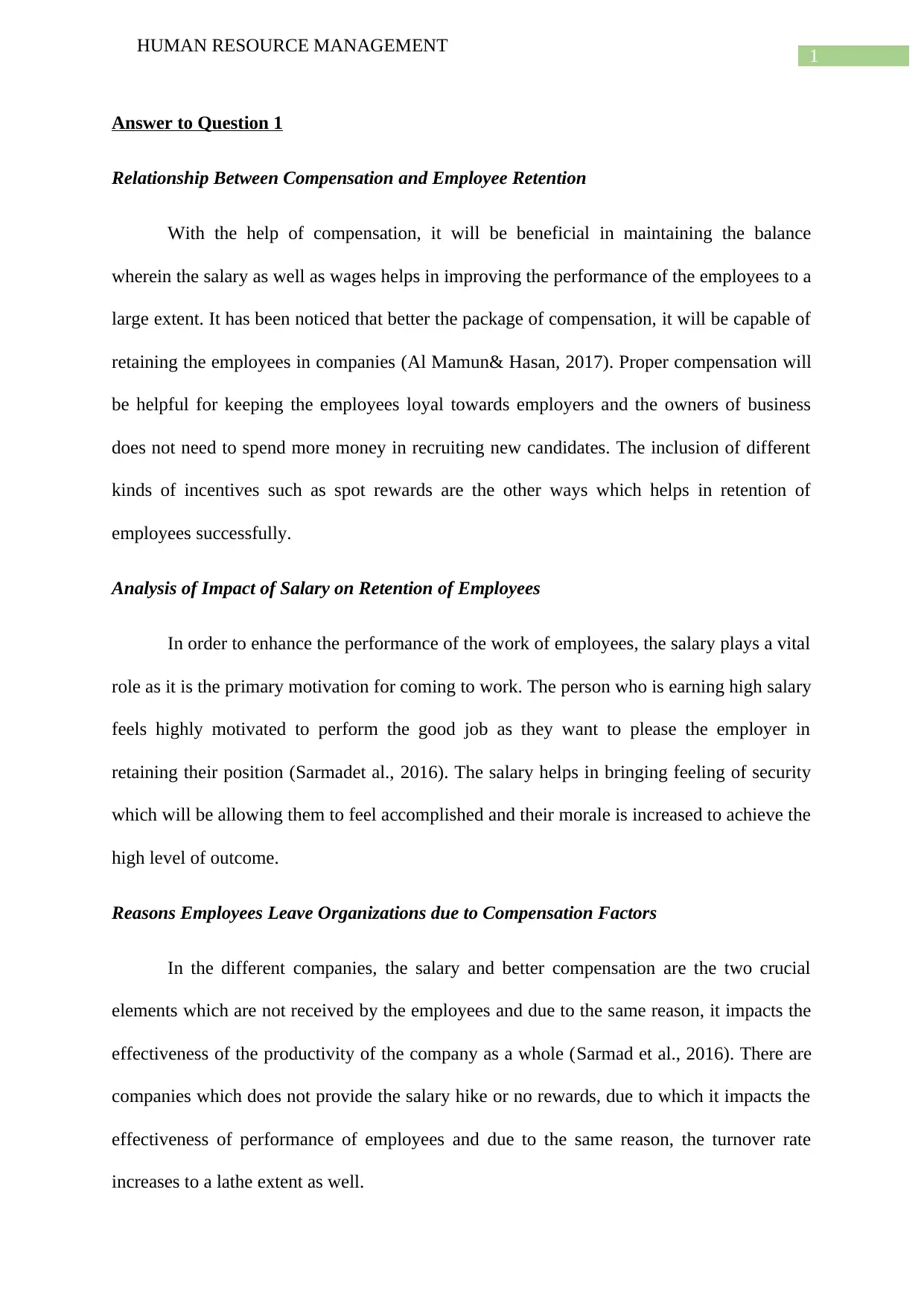
1
HUMAN RESOURCE MANAGEMENT
Answer to Question 1
Relationship Between Compensation and Employee Retention
With the help of compensation, it will be beneficial in maintaining the balance
wherein the salary as well as wages helps in improving the performance of the employees to a
large extent. It has been noticed that better the package of compensation, it will be capable of
retaining the employees in companies (Al Mamun& Hasan, 2017). Proper compensation will
be helpful for keeping the employees loyal towards employers and the owners of business
does not need to spend more money in recruiting new candidates. The inclusion of different
kinds of incentives such as spot rewards are the other ways which helps in retention of
employees successfully.
Analysis of Impact of Salary on Retention of Employees
In order to enhance the performance of the work of employees, the salary plays a vital
role as it is the primary motivation for coming to work. The person who is earning high salary
feels highly motivated to perform the good job as they want to please the employer in
retaining their position (Sarmadet al., 2016). The salary helps in bringing feeling of security
which will be allowing them to feel accomplished and their morale is increased to achieve the
high level of outcome.
Reasons Employees Leave Organizations due to Compensation Factors
In the different companies, the salary and better compensation are the two crucial
elements which are not received by the employees and due to the same reason, it impacts the
effectiveness of the productivity of the company as a whole (Sarmad et al., 2016). There are
companies which does not provide the salary hike or no rewards, due to which it impacts the
effectiveness of performance of employees and due to the same reason, the turnover rate
increases to a lathe extent as well.
HUMAN RESOURCE MANAGEMENT
Answer to Question 1
Relationship Between Compensation and Employee Retention
With the help of compensation, it will be beneficial in maintaining the balance
wherein the salary as well as wages helps in improving the performance of the employees to a
large extent. It has been noticed that better the package of compensation, it will be capable of
retaining the employees in companies (Al Mamun& Hasan, 2017). Proper compensation will
be helpful for keeping the employees loyal towards employers and the owners of business
does not need to spend more money in recruiting new candidates. The inclusion of different
kinds of incentives such as spot rewards are the other ways which helps in retention of
employees successfully.
Analysis of Impact of Salary on Retention of Employees
In order to enhance the performance of the work of employees, the salary plays a vital
role as it is the primary motivation for coming to work. The person who is earning high salary
feels highly motivated to perform the good job as they want to please the employer in
retaining their position (Sarmadet al., 2016). The salary helps in bringing feeling of security
which will be allowing them to feel accomplished and their morale is increased to achieve the
high level of outcome.
Reasons Employees Leave Organizations due to Compensation Factors
In the different companies, the salary and better compensation are the two crucial
elements which are not received by the employees and due to the same reason, it impacts the
effectiveness of the productivity of the company as a whole (Sarmad et al., 2016). There are
companies which does not provide the salary hike or no rewards, due to which it impacts the
effectiveness of performance of employees and due to the same reason, the turnover rate
increases to a lathe extent as well.
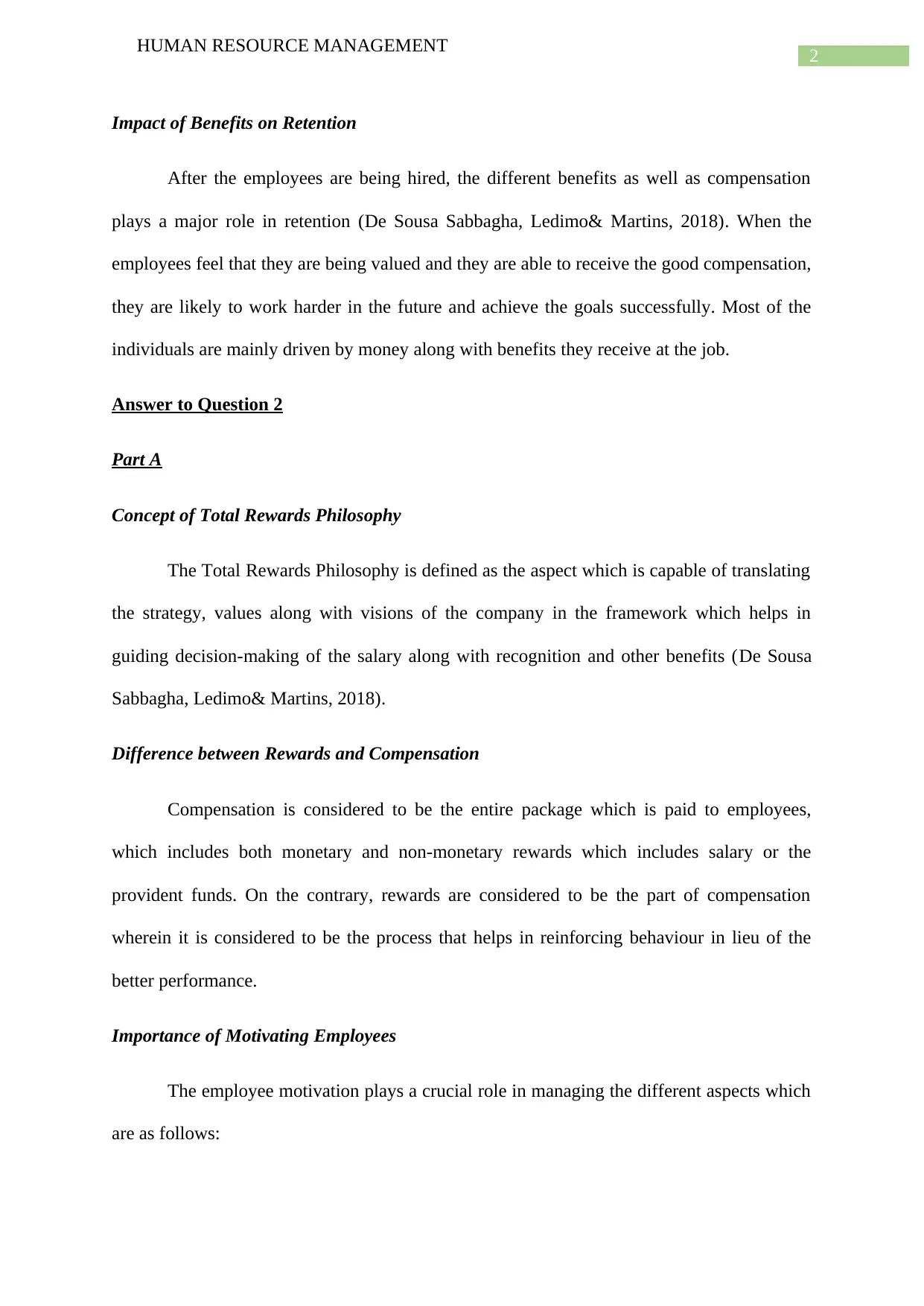
2
HUMAN RESOURCE MANAGEMENT
Impact of Benefits on Retention
After the employees are being hired, the different benefits as well as compensation
plays a major role in retention (De Sousa Sabbagha, Ledimo& Martins, 2018). When the
employees feel that they are being valued and they are able to receive the good compensation,
they are likely to work harder in the future and achieve the goals successfully. Most of the
individuals are mainly driven by money along with benefits they receive at the job.
Answer to Question 2
Part A
Concept of Total Rewards Philosophy
The Total Rewards Philosophy is defined as the aspect which is capable of translating
the strategy, values along with visions of the company in the framework which helps in
guiding decision-making of the salary along with recognition and other benefits (De Sousa
Sabbagha, Ledimo& Martins, 2018).
Difference between Rewards and Compensation
Compensation is considered to be the entire package which is paid to employees,
which includes both monetary and non-monetary rewards which includes salary or the
provident funds. On the contrary, rewards are considered to be the part of compensation
wherein it is considered to be the process that helps in reinforcing behaviour in lieu of the
better performance.
Importance of Motivating Employees
The employee motivation plays a crucial role in managing the different aspects which
are as follows:
HUMAN RESOURCE MANAGEMENT
Impact of Benefits on Retention
After the employees are being hired, the different benefits as well as compensation
plays a major role in retention (De Sousa Sabbagha, Ledimo& Martins, 2018). When the
employees feel that they are being valued and they are able to receive the good compensation,
they are likely to work harder in the future and achieve the goals successfully. Most of the
individuals are mainly driven by money along with benefits they receive at the job.
Answer to Question 2
Part A
Concept of Total Rewards Philosophy
The Total Rewards Philosophy is defined as the aspect which is capable of translating
the strategy, values along with visions of the company in the framework which helps in
guiding decision-making of the salary along with recognition and other benefits (De Sousa
Sabbagha, Ledimo& Martins, 2018).
Difference between Rewards and Compensation
Compensation is considered to be the entire package which is paid to employees,
which includes both monetary and non-monetary rewards which includes salary or the
provident funds. On the contrary, rewards are considered to be the part of compensation
wherein it is considered to be the process that helps in reinforcing behaviour in lieu of the
better performance.
Importance of Motivating Employees
The employee motivation plays a crucial role in managing the different aspects which
are as follows:
⊘ This is a preview!⊘
Do you want full access?
Subscribe today to unlock all pages.

Trusted by 1+ million students worldwide
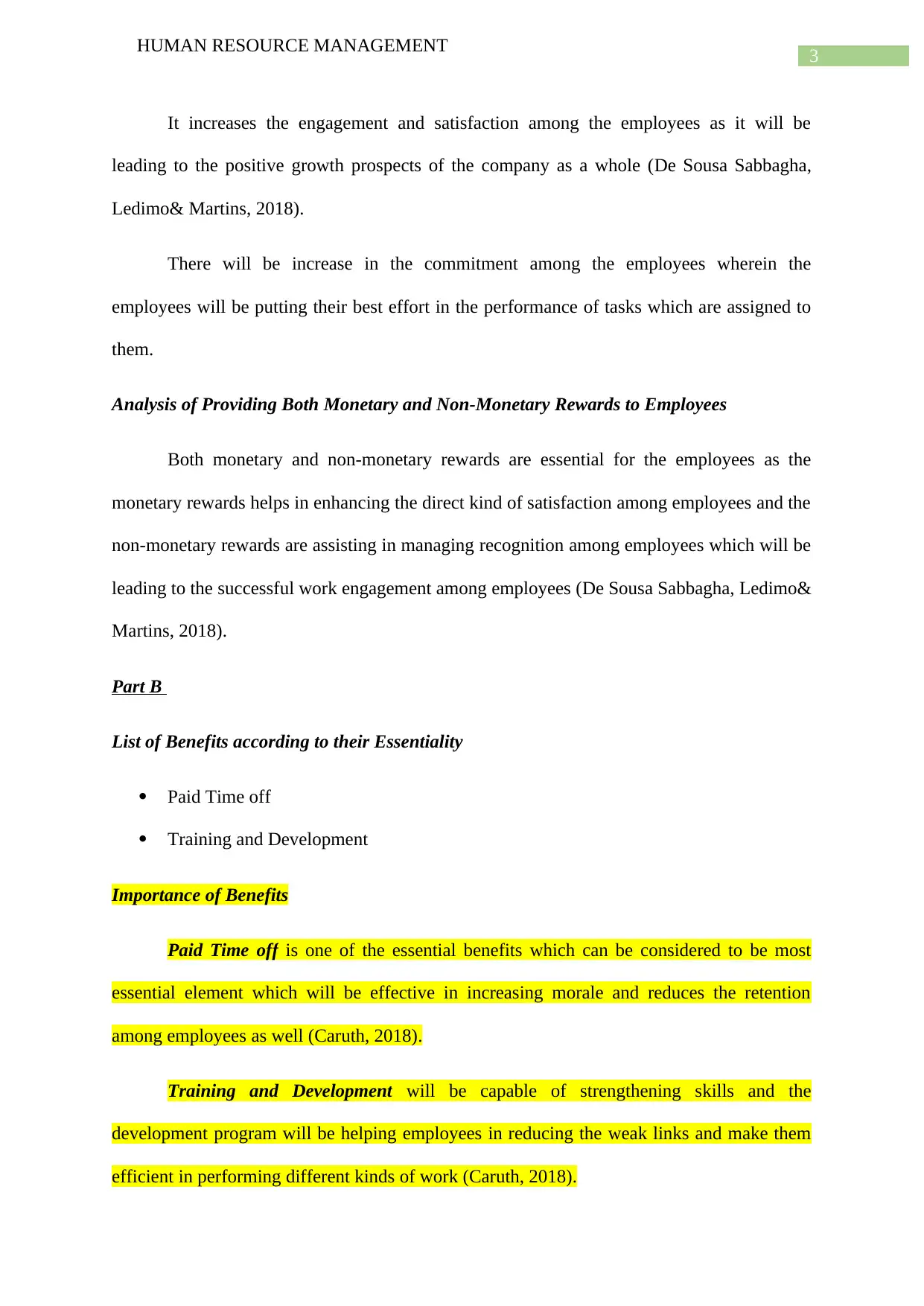
3
HUMAN RESOURCE MANAGEMENT
It increases the engagement and satisfaction among the employees as it will be
leading to the positive growth prospects of the company as a whole (De Sousa Sabbagha,
Ledimo& Martins, 2018).
There will be increase in the commitment among the employees wherein the
employees will be putting their best effort in the performance of tasks which are assigned to
them.
Analysis of Providing Both Monetary and Non-Monetary Rewards to Employees
Both monetary and non-monetary rewards are essential for the employees as the
monetary rewards helps in enhancing the direct kind of satisfaction among employees and the
non-monetary rewards are assisting in managing recognition among employees which will be
leading to the successful work engagement among employees (De Sousa Sabbagha, Ledimo&
Martins, 2018).
Part B
List of Benefits according to their Essentiality
Paid Time off
Training and Development
Importance of Benefits
Paid Time off is one of the essential benefits which can be considered to be most
essential element which will be effective in increasing morale and reduces the retention
among employees as well (Caruth, 2018).
Training and Development will be capable of strengthening skills and the
development program will be helping employees in reducing the weak links and make them
efficient in performing different kinds of work (Caruth, 2018).
HUMAN RESOURCE MANAGEMENT
It increases the engagement and satisfaction among the employees as it will be
leading to the positive growth prospects of the company as a whole (De Sousa Sabbagha,
Ledimo& Martins, 2018).
There will be increase in the commitment among the employees wherein the
employees will be putting their best effort in the performance of tasks which are assigned to
them.
Analysis of Providing Both Monetary and Non-Monetary Rewards to Employees
Both monetary and non-monetary rewards are essential for the employees as the
monetary rewards helps in enhancing the direct kind of satisfaction among employees and the
non-monetary rewards are assisting in managing recognition among employees which will be
leading to the successful work engagement among employees (De Sousa Sabbagha, Ledimo&
Martins, 2018).
Part B
List of Benefits according to their Essentiality
Paid Time off
Training and Development
Importance of Benefits
Paid Time off is one of the essential benefits which can be considered to be most
essential element which will be effective in increasing morale and reduces the retention
among employees as well (Caruth, 2018).
Training and Development will be capable of strengthening skills and the
development program will be helping employees in reducing the weak links and make them
efficient in performing different kinds of work (Caruth, 2018).
Paraphrase This Document
Need a fresh take? Get an instant paraphrase of this document with our AI Paraphraser
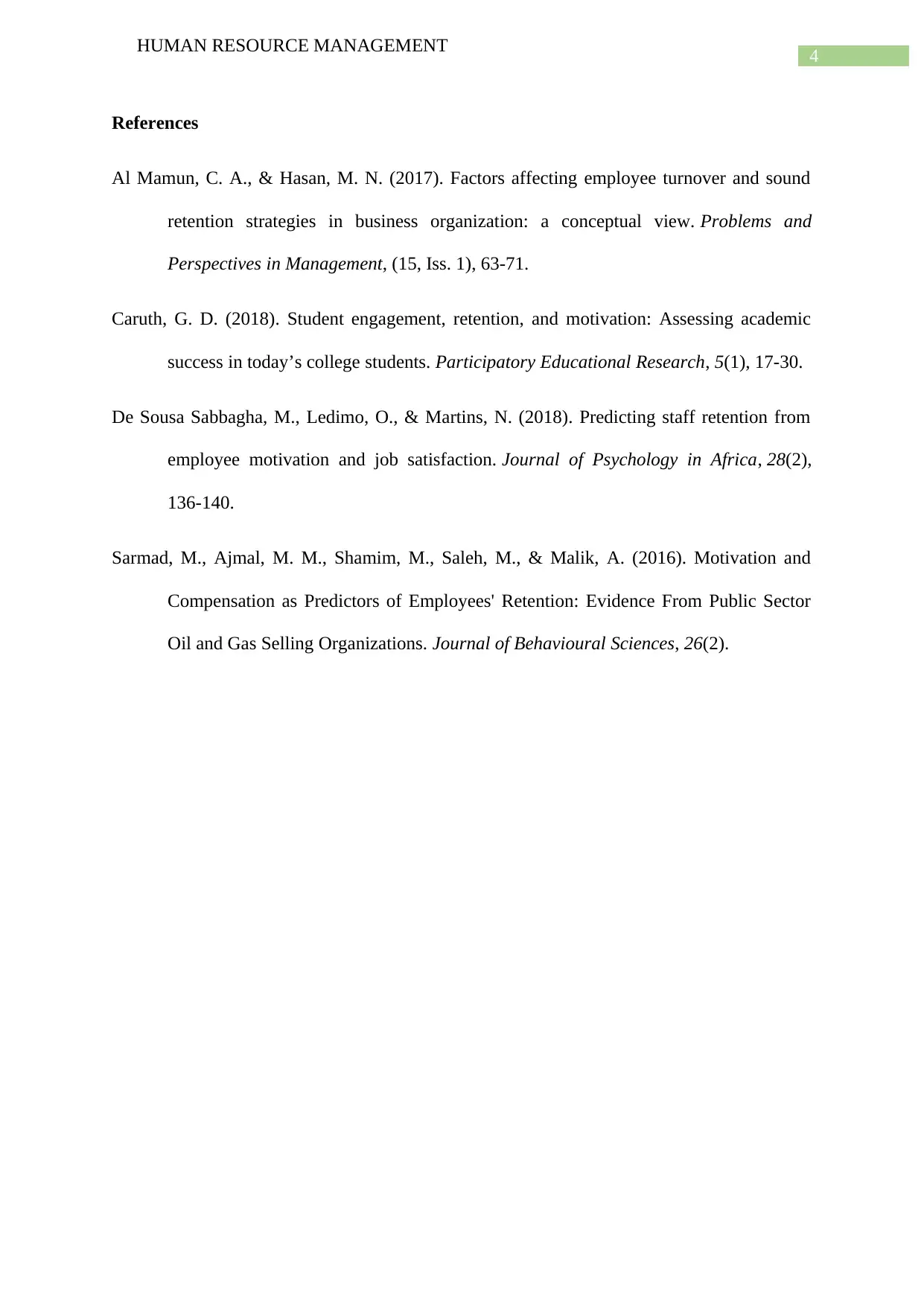
4
HUMAN RESOURCE MANAGEMENT
References
Al Mamun, C. A., & Hasan, M. N. (2017). Factors affecting employee turnover and sound
retention strategies in business organization: a conceptual view. Problems and
Perspectives in Management, (15, Iss. 1), 63-71.
Caruth, G. D. (2018). Student engagement, retention, and motivation: Assessing academic
success in today’s college students. Participatory Educational Research, 5(1), 17-30.
De Sousa Sabbagha, M., Ledimo, O., & Martins, N. (2018). Predicting staff retention from
employee motivation and job satisfaction. Journal of Psychology in Africa, 28(2),
136-140.
Sarmad, M., Ajmal, M. M., Shamim, M., Saleh, M., & Malik, A. (2016). Motivation and
Compensation as Predictors of Employees' Retention: Evidence From Public Sector
Oil and Gas Selling Organizations. Journal of Behavioural Sciences, 26(2).
HUMAN RESOURCE MANAGEMENT
References
Al Mamun, C. A., & Hasan, M. N. (2017). Factors affecting employee turnover and sound
retention strategies in business organization: a conceptual view. Problems and
Perspectives in Management, (15, Iss. 1), 63-71.
Caruth, G. D. (2018). Student engagement, retention, and motivation: Assessing academic
success in today’s college students. Participatory Educational Research, 5(1), 17-30.
De Sousa Sabbagha, M., Ledimo, O., & Martins, N. (2018). Predicting staff retention from
employee motivation and job satisfaction. Journal of Psychology in Africa, 28(2),
136-140.
Sarmad, M., Ajmal, M. M., Shamim, M., Saleh, M., & Malik, A. (2016). Motivation and
Compensation as Predictors of Employees' Retention: Evidence From Public Sector
Oil and Gas Selling Organizations. Journal of Behavioural Sciences, 26(2).
1 out of 5
Related Documents
Your All-in-One AI-Powered Toolkit for Academic Success.
+13062052269
info@desklib.com
Available 24*7 on WhatsApp / Email
![[object Object]](/_next/static/media/star-bottom.7253800d.svg)
Unlock your academic potential
Copyright © 2020–2026 A2Z Services. All Rights Reserved. Developed and managed by ZUCOL.





